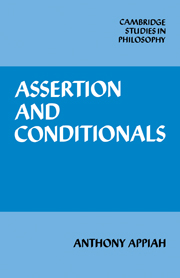2 - A theory of the mind
Published online by Cambridge University Press: 07 October 2011
Summary
The concept of a mental state is primarily the concept of a state of the person apt for bringing about a certain sort of behaviour.
(Armstrong, 1968: 82)OVERVIEW
The central claim of this book is that the meaning of an asserted sentence is, in a certain sense, the content of the belief that it expresses. So I must begin with a story about beliefs and their contents. In fact, as I have said, my story is functionalism, the story encapsulated in the remark of Armstrong's which provides my epigraph. I need to give the outlines of functionalism's picture of the mental because the general account of belief and of the contents of beliefs is needed if I am to make good my central claim. Since my interest is mainly in assertion, and in beliefs as what assertions express, I concentrate mainly on giving an account of the mental state of believing; but because, as I shall argue, that account can only be given in the context of a theory that also takes account of desires, I am obliged also to say something about desire.
The theory I hold is functionalist: for it claims that we can state sufficient a priori truths about the causal roles of mental states in interaction with each other and with events outside the mind, to be able to individuate those mental states by their causal roles.
- Type
- Chapter
- Information
- Assertion and Conditionals , pp. 11 - 38Publisher: Cambridge University PressPrint publication year: 1985

